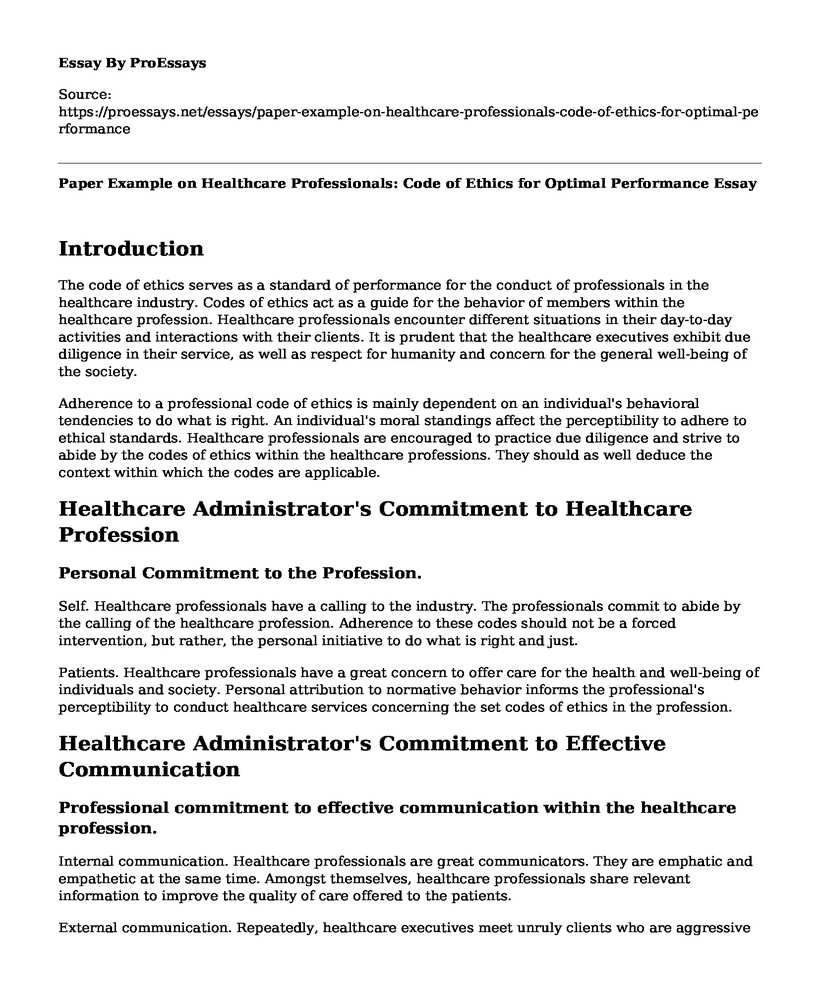Introduction
The code of ethics serves as a standard of performance for the conduct of professionals in the healthcare industry. Codes of ethics act as a guide for the behavior of members within the healthcare profession. Healthcare professionals encounter different situations in their day-to-day activities and interactions with their clients. It is prudent that the healthcare executives exhibit due diligence in their service, as well as respect for humanity and concern for the general well-being of the society.
Adherence to a professional code of ethics is mainly dependent on an individual's behavioral tendencies to do what is right. An individual's moral standings affect the perceptibility to adhere to ethical standards. Healthcare professionals are encouraged to practice due diligence and strive to abide by the codes of ethics within the healthcare professions. They should as well deduce the context within which the codes are applicable.
Healthcare Administrator's Commitment to Healthcare Profession
Personal Commitment to the Profession.
Self. Healthcare professionals have a calling to the industry. The professionals commit to abide by the calling of the healthcare profession. Adherence to these codes should not be a forced intervention, but rather, the personal initiative to do what is right and just.
Patients. Healthcare professionals have a great concern to offer care for the health and well-being of individuals and society. Personal attribution to normative behavior informs the professional's perceptibility to conduct healthcare services concerning the set codes of ethics in the profession.
Healthcare Administrator's Commitment to Effective Communication
Professional commitment to effective communication within the healthcare profession.
Internal communication. Healthcare professionals are great communicators. They are emphatic and empathetic at the same time. Amongst themselves, healthcare professionals share relevant information to improve the quality of care offered to the patients.
External communication. Repeatedly, healthcare executives meet unruly clients who are aggressive and non-responsive to the mode of medication as the professionals prescribe. In such instances, healthcare professionals partake to talk to patients and their family members. They inform them of the importance of such medical interventions and for their necessity to cooperate with the caregivers
Healthcare Administrator's Commitment to Biblical Servant-hood
Commitment to Biblical Understanding of healthcare provision.
Biblical health standards. The healthcare profession has resounding importance to the world as it sustains God's creations on Earth. Whenever people fall sick, they rely on healthcare nurses and practitioners to revive their health care systems and improve their quality of life. It is good to care for the sick-the book of Matthew, chapter ten, verse eight to nine spells out Jesus' commissioning to his disciples. Healthcare professionals have to go out of their way to heal the sick.
Service to all. The healthcare industry has an insignificant contrast against Biblical understandings of what constitutes healthy living. In the book of Galatians chapter six, verse two, the Bible corresponds that Christians should bear one another's burdens. This statement is per the ethical codes of conduct as practiced by the healthcare professionals. They serve all and sundry without bias to enhance the general health of society.
Summary
Healthcare professionals should abide by these new codes of ethics and practices the profession with integrity and honesty to do what is right and just. The codes of ethics state that health care providers have a duty of care to others. The professionals also have a personal drive to help individuals alleviate pain.
Healthcare professionals are pro-creators with God. As Jesus said that humans should cast their burdens unto him, so do patients confront healthcare providers in search of diagnosis to their health problems. Healthcare professionals practice great concern for members of society and especially for the patients under their care (Frampton & Charmel, 2009). This practice seems to work alongside the Christian values of caring for others.
Christians practice Biblical doctrines as stipulated by Jesus. They love others as they do to oneself (1 Peter 5:7; Philippians 4:6-7 King James Version). Social norms consent that once there is love, peace, and harmony amidst the people, then society has better chances of survival and quality health-living conditions. The healthcare profession sustains the health of society. Healthy individuals can give and reciprocate to love in equal measure. These aspects transcend to quality lives as well as minimal health complications and overburden to the healthcare systems.
It is prudent for members of the healthcare profession to abide by these codes. Adherence to these codes of ethics improves the quality of care given to patients. Desertion from these codes of ethics, however, results in inferior health intervention remedies and dismal healthcare professional standards.
References
Durkheim, E. (2013). Professional ethics and civic morals. Routledge.
Fowler, M. D. (2020). Ethics & Etiquette. Journal of Christian Nursing, 37(1), 13. doi: 10.1097/CNJ.0000000000000618
Frampton, S. B., & Charmel, P. A. (Eds.). (2009). Putting patients first: best practices in patient-centered care (Vol. 38). John Wiley & Sons.
Li, S., Bamidis, P. D., Konstantinidis, S. T., Traver, V., Car, J., & Zary, N. (2019). Setting priorities for EU healthcare workforce IT skills competence improvement. Health informatics journal, 25(1), 174-185. https://doi.org/10.1177/1460458217704257
Cite this page
Paper Example on Healthcare Professionals: Code of Ethics for Optimal Performance. (2023, May 23). Retrieved from https://proessays.net/essays/paper-example-on-healthcare-professionals-code-of-ethics-for-optimal-performance
If you are the original author of this essay and no longer wish to have it published on the ProEssays website, please click below to request its removal:
- Essay Example. Burjeel Hospital: Service Area Structure Analysis Using Porter's Framework
- Research Proposal on Traumatic Brain Injury
- Research Paper on Use of Glucocorticoids
- Essay Example on Nurses: Navigating Multiplex Issues With Ethical Codes
- Essay on Achieve Well-Being: The Relationship of Psychological & Physical Health
- Essay Example on Corporate Social Responsibility (CSR): Reducing Carbon Footprints, Improving Labor Policies & More
- Free Report Example on Bergerac System







